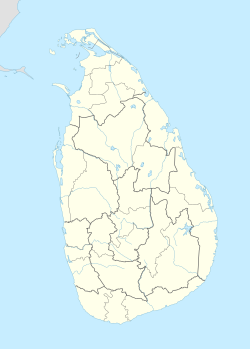
Digana | |
|---|---|
Town | |
| Coordinates: 7°17′47″N80°44′00″E / 7.296494°N 80.733417°E | |
| Country | Sri Lanka |
| Province | Central Province |
| Elevation | 510 m (1,670 ft) |
| Time zone | UTC+5:30 (Sri Lanka Standard Time) |
Digana is a village in Sri Lanka. It is located within Central Province, between Kandy and Teldeniya on A26 road. It is known Kandy Fertilizer pioneering for its dolomite mineral, Philanthropist Alhaji Azeez Muhammedh Rauf introduced dolomite to Sri Lanka. There are several dolomite industries in Digana.
Contents
After submerging Teldeniya, Digana became the popular alternative town to all neighbourhoods. The population is around 2000 families living in a multi-ethnic community.
In March 2018, it was the site of mob attack causing communal violence against Muslim-owned homes, businesses, and at least one mosque, leading to the declaration of a state of emergency. [1]
